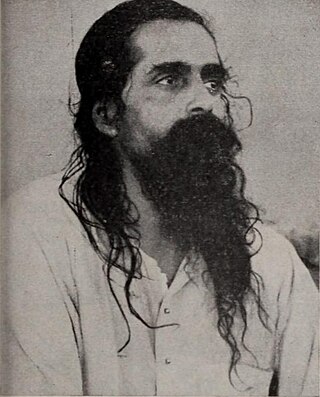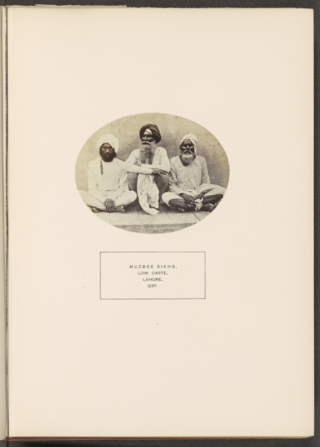
Rashtriya Swayamsevak Sangh is an Indian right-wing, Hindu nationalist volunteer paramilitary organisation. It is the progenitor and leader of a large body of organisations called the Sangh Parivar, which has developed a presence in all facets of Indian society and includes the Bharatiya Janata Party, the ruling political party under the Prime Minister Narendra Modi. The Sarsanghchalak of the RSS is Mohan Bhagwat.

Bajrang Dal is a Hindu nationalist militant organisation that forms the youth wing of the Vishva Hindu Parishad (VHP). It is a member of the right-wing Sangh Parivar. The ideology of the organisation is based on Hindutva. It was founded on 1 October 1984 in Uttar Pradesh, and began spreading more in the 2010s throughout India, although its most significant base remains the northern and central portions of the country.
The Sangh Parivar refers, as an umbrella term, to the collection of Hindutva organisations spawned by the Rashtriya Swayamsevak Sangh (RSS), which remain affiliated to it. These include the political party Bharatiya Janata Party, religious organisation Vishva Hindu Parishad, students union Akhil Bharatiya Vidyarthi Parishad (ABVP), religious militant organisation Bajrang Dal that forms the youth wing of the Vishva Hindu Parishad (VHP), and the worker's union Bharatiya Kisan Sangh. It is also often taken to include allied organisations such as the Shiv Sena, which share the ideology of the RSS.

Madhav Sadashivrao Golwalkar, popularly known as Guruji, was the second Sarsanghchalak ("Chief") of the Rashtriya Swayamsevak Sangh (RSS). Golwalkar is considered one of the most influential and prominent figures among Rashtriya Swayamsevak Sangh by his followers.

Dal Khalsa is an extremist Sikh organisation, based in the city of Amritsar. The outfit was formed in 1978 by Gajinder Singh, the hijacker of Indian Airlines Flight 423. It came to prominence during Insurgency in Punjab, India along with Jarnail Singh Bhindranwale in 1981. Members of the Dal Khalsa have also been accused of the assassination of Lala Jagat Narain. The primary aim of Dal Khalsa is to form a religion-based Sikh nation called Khalistan.

The Insurgency in Punjab, India was an armed campaign by the militants of the Khalistan Movement from the mid-1980s to the mid-1990s. Economic and social pressures driven by the Green Revolution prompted calls for Sikh autonomy and separatism. This movement was initially peaceful, but foreign involvement and political pressures drove a heavy handed response from Indian authorities. The demand for a separate Sikh state gained momentum after the Indian Army's Operation Blue Star in 1984 aimed to flush out militants residing in the Golden Temple in Amritsar, a holy site for Sikhs. Terrorism, police brutality and corruption of the authorities greatly exacerbated a tense situation. By the mid-1980s, the movement had evolved into a militant secessionist crisis due to the perceived indifference of the Indian state in regards to mutual negotiations. Eventually, more effective police and military operations, combined with a policy of rapprochement by the Indian government and the election loss of separatist sympathizers in the 1992 Punjab Legislative Assembly election, largely quelled the rebellion by the mid-1990s.

The Khalistan Liberation Force (KLF) is a Khalistani separatist militant organization based in the Indian state of Punjab. Its motive is the creation of a sovereign Sikh state called Khalistan via armed struggle. The KLF is one of the key fighting forces of the Khalistan movement. It was responsible for assassinations, abductions and military engagements with the Indian Armed Forces during the Insurgency in Punjab, India. The KLF is listed as a designated terrorist group by the Republic of India.

Mazhabi Sikh is a community from Northern India, especially Punjab region, who follow Sikhism. Mazhabi are part of wider category of Dalit Sikhs, who convert from the hindu Valmiki community. The word Mazhabi is derived from the Arabic term mazhab, and can be translated as the faithful. They live mainly in Indian Punjab, Rajasthan and Haryana.

Madhukar Dattatraya Deoras, was the third Sarsanghchalak of the Rashtriya Swayamsevak Sangh (RSS).

The Muslim Rashtriya Manch is a Muslim organisation in India, inspired by the Hindu nationalist Rashtriya Swayamsevak Sangh (RSS). It was formed in 2002 in the presence of the then RSS chief K.S. Sudarshan to grow dialogue with Muslim community.
Hindu nationalism has been collectively referred to as the expression of social and political thought, based on the native spiritual and cultural traditions of the Indian subcontinent. "Hindu nationalism" is a simplistic translation of हिन्दू राष्ट्रवाद. It is better described as "Hindu polity".

Gurbachan Singh Manochahal was Jathedar of Akal Takhat Sahib who founded the Bhindranwale Tiger Force of Khalistan in 1984.
On 8 December 2014, Hindu nationalist groups affiliated to the Rashtriya Swayamsevak Sangh (RSS) were reported to have converted 100 – 250 Muslims to Hinduism in Agra. The functioning of the Indian Parliament was log-jammed in December. News reports indicated that Muslim right wing groups in India have received a ‘lease of life’ in trying to protest the conversions. After a full investigation, the Uttar Pradesh Minorities Commission concluded that the Muslims had not converted as they continued to "remain Muslims."
Ghar Wapsi is the programme of religious conversion to Hinduism from Islam, Christianity, and other religions in India conducted by Indian Hindu nationalist organisations Vishva Hindu Parishad (VHP), Rashtriya Swayamsevak Sangh (RSS) and their allies. The term owes to the Hindu nationalist ideology that all people of India are ancestrally Hindu and, hence, conversion to Hinduism is one of "returning home" to their ancestral roots.
Keshdhari Hindus means "Hindus with long hairs". It is a term used and promoted by the Rashtriya Swayamsevak Sangh, Vishva Hindu Parishad, and other Sangh Parivar organizations for Sikhs to describe them as the sword arm of Hindus and, hence, staunch Indian nationalists.
During the years of 2016 and 2017, multiple attacks on political activists and mostly Hindu religious leaders in the northern Indian state of Punjab were perpetrated by individuals who were allegedly affiliated with the Sikh militant group Khalistan Liberation Force which is a designated terrorist group by India. Those culpable for the attacks were also arrested. The Pakistani agency ISI was allegedly held responsible by India for financing and aiding the militant acts to foment religious disturbances in the state.

Rulda Singh Kharoud was an Indian politician. He was president of Rashtriya Sikh Sangat. He was also general secretary of NRI wing of Bharatiya Janata Party. In July 2009, Singh was shot by two or three armed assailants outside his residence, and died weeks later to his wounds.

The Sarbat Khalsa of 1986 was one congregation of the Guru Khalsa Panth, including the Damdami Taksal, Akal Takht, Panthic Committee (Manochahal), Panthic Committee (Zaffarwal), Kharku Sikhs, Tarna Dal (Hariabelan), Tarna Dal, Bidhi Chand Dal and the Shiromani Budha Dal.

Harmeet Singh also known as PhD or Happy was the 8th chief of Khalistan Liberation Force.

Harminder Singh Nihang, also known as Harminder Singh Mintoo, was a prominent Sikh militant and the 7th leader of Khalistan Liberation Force. Nihang was instrumental in reinvigorating the Khalistan Movement in the 21st Century. Nihang died in police custody.














